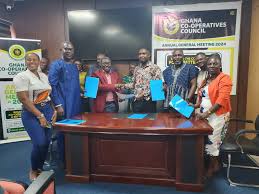
The Ghana Co-operative Council held its 2nd Annual General Meeting (AGM) in Accra, urging cocoa farmers to embrace the cooperative model to strengthen their collective voice and promote resilience within Ghana’s cocoa value chain.
As part of the AGM, the council signed a Memorandum of Understanding (MOU) with three key members: the Ghana Cocoa Cooperative Association and Marketing Ltd, the Credit Unions Association, and the Transport Cooperatives Association.
This initiative aims to operationalise the sixth cooperative principle, focusing on collaboration to drive impact and growth among members.
The event brought together over 60 farmer cooperatives, unions, and stakeholders within the cocoa value chain.
Addressing the gathering, Dr Bernad Bingab, Board Chairman of the Ghana Co-operative Council, outlined the progress made during 2024 and reflected on challenges from the previous year.
He emphasized the council’s determination to build a sustainable future for Ghana’s cooperative movement:
“Together, we recognised the urgent need to strengthen our supra-apex body, reduce reliance on donor partners and government, and build a sustainable future.”
Dr. Bingab highlighted the establishment of a development fund to support cooperative education, training, and distressed cooperatives. He revealed that member societies had already contributed approximately GH£60,000 to the fund:
“The fund will serve as a cornerstone for cooperative education, training, development, and support for distressed cooperatives as well as meet our national and international obligations.”
He also announced the signing of a tripartite MOU to pilot collaboration among transport, financial, and agricultural cooperatives:
“Our goal is to harness collaboration to create jobs, alleviate poverty, and strengthen our economy. Together, we will continue to build a thriving cooperative movement that uplifts our members and contributes to the prosperity of our nation.”
Former Acting Registrar of Cooperative Societies, Kofi Kutame, highlighted the importance of interlinkages between agricultural, financial, and transport cooperatives:
“Co-operatives are better together. By working together, cooperatives gain the expertise, scale, and support necessary to heighten awareness, sustainability, and impact.”
He projected that within six months, the cooperatives would be ready to access their first loans from credit unions:
“The officers of the Department of Cooperatives, the Ghana Cooperative Council, and the local cocoa extension officers could partner with the credit union to provide the needed technical knowledge.”
Habiba Nyarko Agyemang, Country Representative for Agriterra in Ghana, reiterated Agriterra’s commitment to empowering cocoa cooperatives to position themselves strategically in the cocoa value chain.
“Agriterra’s goal is to support Farmer Organisations in increasing their purchasing and selling power, creating a united voice for policymakers, and establishing agri-services that offer competitive market solutions for their member farmers.”
She emphasized the importance of cooperative principles in achieving sustainable economic development:
“We at Agriterra believe that farmer cooperatives can achieve significant impact when adequately guided by the cooperative principles.”
Leaders of farmer groups expressed gratitude to the Ghana Co-operative Council, Agriterra, and other stakeholders for their technical and strategic support.
National President of the Ghana Cooperative Cocoa Farmers Association, Issifu Issaka, said, “Together, we will build a brighter and more prosperous future for farmers.”
The AGM was attended by officials from various organisations, including the Cocoa Health and Extension Division, Ghana Civil Society Cocoa Platform, Fair Trade Africa, Solidaridad, SOCODEVI, and several cocoa farmer groups.



